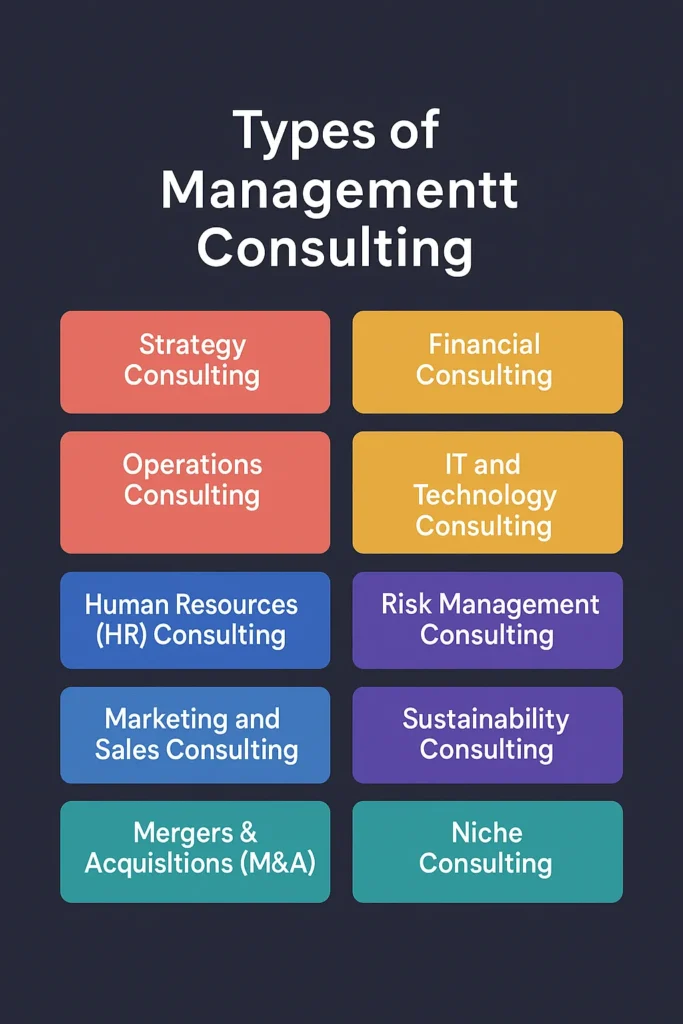
Executive Summary
Management consulting is a professional service that helps organizations improve performance, solve complex problems, and achieve strategic goals through expert advice, analysis, and implementation support. Management consultants work with businesses, government agencies, and non-profits to identify challenges, recommend solutions, and optimize operations.
This discipline combines deep business knowledge, analytical skills, industry expertise, and strategic thinking to guide organizations in areas such as organizational structure, operational efficiency, financial performance, technology integration, and human resources management.
Management consulting has evolved from an advisory role to a hands-on strategic partnership, where consultants not only provide recommendations but also help implement solutions. The objective is to create measurable improvements, sustainable growth, and a competitive advantage for clients.
This comprehensive guide explores what management consulting is, its history, core functions, types, benefits, challenges, methodologies, tools, real-world applications, and career pathways in the field.
Table of Content
Introduction
In an increasingly complex business environment, organizations face challenges ranging from market disruption, regulatory compliance, and technological innovation to operational inefficiencies and talent management. Management consulting serves as a critical resource to help organizations navigate these challenges and optimize their operations.
At its core, management consulting is about problem-solving, strategic thinking, and creating value. Consultants leverage their expertise, analytical capabilities, and industry insights to diagnose issues, design solutions, and support clients in implementing changes.
Unlike traditional advisory services, modern management consulting focuses on measurable outcomes, long-term impact, and transformation. Consultants act as trusted partners, providing guidance that aligns with the client’s goals, culture, and market realities.
History of Management Consulting
- Origins in the Early 20th Century – The first consulting firms emerged to help businesses improve efficiency and manage growth during industrialization.
- Arthur D. Little – Founded in 1886, often credited as one of the first management consulting firms.
- Growth of Strategy Consulting – Firms like McKinsey & Company, Boston Consulting Group (BCG), and Bain & Company pioneered strategic business consulting in the mid-20th century.
- Post-War Expansion – Demand for organizational expertise surged as companies expanded globally.
- Diversification in the 1970s–1980s – Consulting services expanded to human resources, technology, finance, and operations.
- Rise of IT and Technology Consulting – The 1990s saw firms advising clients on digital transformation and IT strategy.
- Globalization – Consulting became a global industry serving multinational corporations and governments.
- Advent of Specialized Consulting – Emergence of niche services like sustainability, healthcare, and risk management.
- Management Consulting Today – Integrates strategy, technology, data analytics, and organizational change.
- Future Trends – AI, automation, and digital consulting are reshaping the industry.
Core Functions of Management Consulting
- Strategic Advisory – Assisting clients with long-term business strategy, market entry, competitive analysis, and growth planning.
- Operational Improvement – Identifying inefficiencies in processes, supply chains, and organizational workflows.
- Financial Advisory – Enhancing profitability, managing costs, and advising on mergers and acquisitions.
- Human Capital Management – Optimizing workforce, organizational structure, leadership development, and talent strategy.
- Technology and IT Consulting – Supporting digital transformation, software implementation, and IT strategy.
- Risk and Compliance Consulting – Evaluating regulatory risks, internal controls, and risk mitigation strategies.
- Change Management – Guiding organizations through cultural, structural, or operational transformations.
- Market Research and Analytics – Conducting research to inform decisions and evaluate trends.
- Project Management – Planning, executing, and monitoring projects to achieve organizational goals.
- Sustainability and ESG Consulting – Advising on environmental, social, and governance strategies for long-term impact.
Types of Management Consulting

- Strategy Consulting – Focuses on high-level business strategy, growth, and competitive positioning.
- Operations Consulting – Optimizes processes, supply chains, and operational efficiency.
- Financial Consulting – Provides financial planning, restructuring, and investment advisory.
- IT and Technology Consulting – Supports digital transformation, cybersecurity, and IT architecture.
- Human Resources (HR) Consulting – Addresses workforce planning, talent acquisition, and organizational culture.
- Marketing and Sales Consulting – Enhances branding, customer experience, and sales effectiveness.
- Risk Management Consulting – Assesses risks, regulatory compliance, and internal controls.
- Sustainability Consulting – Develops ESG strategies, carbon footprint reduction, and social impact initiatives.
- Mergers & Acquisitions (M&A) Consulting – Supports due diligence, integration, and strategic acquisitions.
- Niche Consulting – Specialized services in healthcare, energy, defense, or government sectors.
Management Consulting Methodologies
- Problem-Solving Approach – Identifying root causes and developing actionable solutions.
- Data-Driven Analysis – Using quantitative and qualitative data to inform decisions.
- Benchmarking – Comparing client performance with industry standards to identify gaps.
- Business Process Reengineering – Redesigning workflows to improve efficiency.
- SWOT Analysis – Evaluating strengths, weaknesses, opportunities, and threats.
- Balanced Scorecard – Measuring performance across financial, customer, internal, and learning perspectives.
- Lean and Six Sigma – Reducing waste, improving quality, and streamlining operations.
- Change Management Frameworks – Structured approaches to support organizational transformation.
- Scenario Planning – Preparing strategies for multiple potential future outcomes.
- Agile Consulting – Implementing iterative solutions and adaptive strategies for dynamic environments.
Tools and Technologies in Management Consulting
- Business Intelligence Tools: Tableau, Power BI, QlikView for analytics and visualization.
- Project Management Software: Microsoft Project, Asana, Jira for planning and execution.
- Financial Modeling Tools: Excel, Oracle Hyperion for financial analysis and forecasting.
- Collaboration Platforms: Slack, Microsoft Teams for team communication.
- CRM and ERP Systems: Salesforce, SAP, Oracle for operational consulting.
- Data Analytics Tools: Python, R, SQL for statistical analysis.
- Presentation Tools: PowerPoint, Prezi for client reporting and communication.
- Knowledge Management Systems: SharePoint, Confluence for research and best practices.
- Market Research Tools: Statista, Nielsen, IBISWorld for industry insights.
- AI & Automation Tools: ChatGPT, UiPath, Automation Anywhere for digital solutions.
Benefits of Management Consulting
- Expert Insight – Access to industry knowledge and specialized expertise.
- Objective Perspective – Unbiased assessment of problems and opportunities.
- Operational Efficiency – Streamlining processes to reduce costs and improve output.
- Strategic Planning – Guidance on long-term growth and competitive advantage.
- Change Facilitation – Expertise in implementing organizational transformations.
- Risk Reduction – Identifying potential risks and mitigation strategies.
- Innovation and Growth – Supporting new product development and market entry.
- Knowledge Transfer – Empowering clients with skills, frameworks, and best practices.
- Financial Performance – Optimizing revenue, cost, and investment strategies.
- Global Perspective – Insights from working with diverse industries and geographies.
Challenges in Management Consulting
- Resistance to Change – Clients may resist adopting recommendations.
- Complex Stakeholder Environment – Balancing diverse interests and expectations.
- Information Gaps – Lack of accurate or complete data for analysis.
- Time Constraints – Projects often require quick results and deliverables.
- Scope Creep – Expanding project scope beyond initial agreements.
- Cultural Misalignment – Solutions may conflict with organizational culture.
- High Expectations – Pressure to deliver measurable outcomes and ROI.
- Competitive Industry – Standing out among numerous consulting firms.
- Integration Challenges – Implementing recommendations across multiple departments.
- Global Risks – Regulatory, geopolitical, and economic uncertainties affecting outcomes.
Real-World Applications of Management Consulting
- Corporate Strategy Development – Helping companies define growth trajectories and market expansion.
- Operational Turnarounds – Restructuring failing businesses to improve efficiency and profitability.
- Digital Transformation – Guiding firms through technology adoption, automation, and IT strategy.
- Mergers and Acquisitions – Conducting due diligence and integration planning for corporate transactions.
- Human Capital Optimization – Developing leadership pipelines, workforce planning, and employee engagement strategies.
- Market Entry Strategies – Advising organizations on entering new regions or industries.
- Supply Chain Optimization – Streamlining logistics, procurement, and production processes.
- Risk Management Implementation – Creating frameworks to mitigate financial, operational, and regulatory risks.
- Sustainability Initiatives – Assisting companies in ESG strategy development and carbon footprint reduction.
- Crisis Management – Providing guidance during financial, operational, or reputational crises.
Career in Management Consulting

Skills Required:
- Analytical and problem-solving skills
- Strong communication and presentation abilities
- Business acumen and industry knowledge
- Project management expertise
- Adaptability and resilience
- Leadership and teamwork skills
- Digital literacy and data analysis capabilities
Typical Career Path:
- Analyst / Associate – Entry-level, responsible for research, analysis, and report preparation.
- Consultant / Senior Consultant – Works on project design, client interaction, and solution development.
- Manager / Engagement Manager – Leads teams, manages projects, and oversees client delivery.
- Principal / Associate Partner – Strategic advisor, client relationship management, business development.
- Partner / Director – Leads practice areas, drives firm strategy, and maintains senior client relationships.
Work Environment:
- Consulting firms (strategy, operations, IT)
- Internal consulting teams within large corporations
- Non-profits and government agencies
- Freelance or independent consulting
Future Trends in Management Consulting
- Digital and AI-Driven Consulting – Leveraging AI, data analytics, and machine learning for smarter solutions.
- Remote and Hybrid Consulting Models – Serving clients virtually with global collaboration tools.
- Sustainability and ESG Focus – Greater emphasis on social responsibility and environmental impact.
- Integrated Solutions – Combining strategy, operations, technology, and human capital expertise.
- Agile and Adaptive Consulting – Iterative approaches for dynamic business challenges.
- Personalization of Consulting – Tailored solutions to client-specific challenges.
- Knowledge Sharing and Automation – Using digital platforms to enhance efficiency and knowledge transfer.
- Globalization and Emerging Markets – Expansion of consulting services in developing economies.
- Cybersecurity Advisory – Growing demand for digital risk and security consulting.
- Data-Driven Decision Making – Increasing reliance on predictive analytics and business intelligence.
Conclusion
Management consulting is a dynamic, multifaceted profession that drives organizational success by providing expertise, analysis, and strategic guidance. By leveraging deep industry knowledge, analytical tools, and structured methodologies, management consultants help organizations navigate complex challenges, optimize operations, and achieve measurable outcomes.
From strategy and operations to digital transformation, human capital management, and risk mitigation, management consulting plays a critical role in shaping the growth and sustainability of businesses, governments, and non-profits worldwide.
For organizations seeking to remain competitive in today’s fast-paced environment, management consulting offers insight, innovation, and practical solutions to achieve strategic objectives and long-term success.


